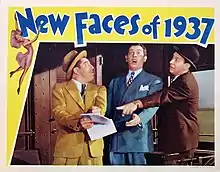| New Faces of 1937 | |
|---|---|
 Lobby card to New Faces of 1937 | |
| Directed by | Leigh Jason James Anderson (assistant) |
| Written by | Story: George Bradshaw ("Shoestring") Sketch: David Freedman ("A Day at the Brokers") Adaptation: Harold Kussell Harry Clork Howard J. Green Screenplay: Nat Perrin Philip G. Epstein Irv S. Brecher |
| Produced by | Edward Small |
| Starring | Joe Penner Milton Berle Parkyakarkus Harriet Hilliard William Brady Jerome Cowan Thelma Leeds |
| Cinematography | J. Roy Hunt |
| Edited by | George Crone |
| Music by | Roy Webb |
Production company | |
| Distributed by | RKO Radio Pictures (1937) (USA) (theatrical) C&C Television Corporation (1955) (USA) (TV) RKO Home Video (USA) (video) (laserdisc) |
Release date |
|
Running time | 100 minutes |
| Country | United States |
| Language | English |
| Budget | $728,000[1] |
| Box office | $775,000[1] |
New Faces of 1937 is a 1937 American musical film directed by Leigh Jason and starring Joe Penner, Milton Berle and Harriet Hilliard. Its plot is similar to The Producers (1968). Intended as the first film of an annual RKO Pictures revue series, poor reception ended plans for future productions.
Plot
A crooked theatrical producer deliberately sets about creating an unsuccessful show after selling more than 100% of it to investors.
Cast
- Joe Penner as Seymore Seymore, aspiring actor
- Milton Berle as Wallington 'Wally' Wedge
- Parkyakarkus as Parky
- Harriet Hilliard as Patricia 'Pat' Harrington
- William Brady as James 'Jimmy' Thompson
- Jerome Cowan as Robert Hunt
- Thelma Leeds as Elaine Dorset
- Lorraine Krueger as Suzy
- Tommy Mack as Judge Hugo Straight, Conductor
- Bert Gordon as Count Mischa Moody
- Patricia Wilder as Pat, Hunt's Secretary
- Richard Lane as Harry Barnes, Broker
- Dudley Clements as Plunkett, Stage Manager
- William Corson as Assistant Stage Manager
- George Rosener as Peter, Stage Doorman
- Dewey Robinson as Joe Guzzola
- Harry C. Bradley as Count Moody's Secretary
Production
An alternate title for this film, which was in production from late March to mid-May 1937, had been listed as Young People. Singer Rene Stone, who appears in the film, was discovered by Edward Small singing while cleaning dishes in a Manhattan restaurant.[2]
Soundtrack
- "New Faces"
- (1937)
- Music and Lyrics by Charles Henderson
- Played during the opening credits
- Sung and danced by showgirls (including The Brian Sisters) and showboys to open the final show
- Danced by Ann Miller
- Sung by Harriet Hilliard and showgirls
- "The Widow in Lace"
- (1937)
- Music by Harold Spina
- Lyrics by Walter Bullock
- Sung by Thelma Leeds and showgirls at rehearsal
- Played and danced by unidentified children, probably The Loria Brothers
- "Our Penthouse on Third Avenue"
- (1937)
- Music by Sammy Fain
- Lyrics by Lew Brown
- Played on piano by Harriet Hilliard and sung by her and William Brady
- "It Goes to Your Feet"
- (1937)
- Music by Sammy Fain
- Lyrics by Lew Brown
- Played and sung by Eddie Rio and Brothers
- Danced by Lowe, Hite and Stanley act, with Lorraine Krueger
- "If I Didn't Have You"
- (1937)
- Music by Sammy Fain
- Lyrics by Lew Brown
- Sung by Harriet Hilliard and William Brady
- "Love Is Never Out of Season"
- (1937)
- Music by Sammy Fain
- Lyrics by Lew Brown
- Sung by William Brady and danced by Harriet Hilliard and male chorus
- "When the Berry Blossoms Bloom"
- (1937)
- Written by Joe Penner and Hal Raynor
- Sung and danced by Joe Penner in the show
- "Peckin'"
- (1936)
- Music and Lyrics by Ben Pollack and Harry James
- Additional lyrics by Eddie Cherkose (1937)
- Sung and danced by The Three Chocolateers, The Four Playboys and chorus in the big finale in the show
- "Bridal Chorus (Here Comes the Bride)"
- (uncredited)
- from "Lohengrin"
- Music by Richard Wagner
- Swing version in the song "Peckin'"
- "The Wedding March"
- (uncredited)
- from "A Midsummer Night's Dream, Op.61"
- Music by Felix Mendelssohn-Bartholdy
- Swing version in the song "Peckin'"
Reception
The film recorded a loss of $258,000.[1] Reviews were mixed.[3][4]
The film was meant to be the first in a series of musical revues designed to introduce new RKO talent, but this did not eventuate. Film writers Richard B. Jewell and Vernon Harbin wrote that:
Containing not a single memorable musical number or inspired comedy routine, this tedious mish-mash caused the studio embarrassment a-plenty. Theatre owners and audiences displayed such hostility towards the Edward Small production in general, and Penner and Parkyakaras in particular, that RKO cancelled plans to make a New Faces of 1938.[5]
References
- 1 2 3 Richard Jewel, 'RKO Film Grosses: 1931–1951', Historical Journal of Film, Radio and Television, Vol 14 No 1, 1994 p57
- ↑ Read, Kendall. (May 18, 1937). "Around and About in Hollywood". Los Angeles Times. p. 10.
- ↑ "THE THEATRE: Top Summer Fare". Wall Street Journal. July 2, 1937. p. 13.
- ↑ FRANK S. NUGENT (July 2, 1937). "THE SCREEN: A Suspicious Glance at 'New Faces of 1937,' at the Music Hall-New Films at Rialto and Palace At the Rialto". New York Times. p. 25.
- ↑ Richard B. Jewell & Vernon Harbin, The RKO Story, Octopus 1984 p 108
External links
- New Faces of 1937 at IMDb
- New Faces of 1937 at the American Film Institute Catalog
- New Faces of 1937 at The New York Times
- New Faces of 1937 at Answers.com
- New Faces of 1937 at Flixster
- New Faces of 1937 at the TCM Movie Database
- "Wanna Buy a Duck?" New Faces of 1937, by Craig Hodgkins